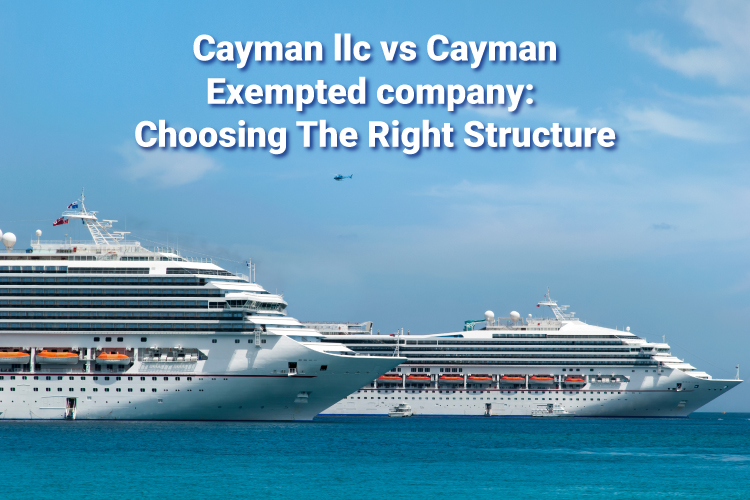In the field of offshore financial jurisdictions, the Cayman Islands have long stood out as a preferred destination for businesses seeking favorable tax environments, regulatory flexibility, and a robust legal framework. Among the various business structures available, two prominent entities often under consideration are the Cayman Limited Liability Company (LLC) and the Cayman Exempted Company. However, in this article, One IBC focuses on providing a comprehensive insight about Cayman LLC.
A comprehensive insight of Cayman LLC
Cayman LLC definition
- A Cayman LLC, also known as a Limited Liability Company, represents a unique legal entity blending features from both corporations and partnerships. Its hallmark lies in its adaptable and straightforward structure, granting members (or owners) limited liability while preserving operational flexibility. Typically, members' liability is confined to their invested capital, shielding personal assets from business debts.
- The Cayman LLC offers a contractual platform enabling members to personalize their associations, entitlements, and responsibilities. This adaptability extends to internal organization, permitting customized management setups and profit distribution plans.

Insight of Cayman LLC
Principal benefits and drawbacks of Cayman LLC
Benefits:
- Limited Liability: Members are shielded from personal liability, safeguarding individual assets.
- Versatility: Adjustable internal frameworks and managerial setups offer tailored solutions.
- Tax Neutrality: Cayman LLCs are exempt from local taxation, bolstering their international allure.
- Worldwide Acceptance: Widely acknowledged and comprehended globally, easing cross-border dealings.
- Asset Safeguarding: Suited for asset holding, investment management, and international commerce
Drawbacks:
- Perceived Complexity: Despite adaptability, the LLC's structure may be perceived as intricate in comparison to alternatives.
- Expenses: Initial establishment and continual compliance expenditures might exceed those of other structures.
- Public Exposure: Certain details, such as registered office particulars, are publicly accessible.
Understanding Cayman LLCs entails grasping their unique attributes, establishment prerequisites, and governance adaptability. While the benefits of limited liability, operational flexibility, and global acceptance render Cayman LLCs appealing to many, businesses should carefully evaluate the associated expenses and intricacies to ensure alignment with their specific requirements and enduring goals within the global business arena.
A comprehensive insight of Cayman exempted company
Definition
- A Cayman Exempted Company is a type of corporate entity established under the Companies Law of the Cayman Islands. These companies are "exempted" because they are typically formed for conducting business activities outside the Cayman Islands. As a result, they enjoy certain exemptions from local taxation and regulatory requirements.
- The Cayman Islands offer a conducive environment for businesses seeking to establish a presence in a reputable offshore jurisdiction. Whether opting for a Cayman LLC or an Exempted Company, businesses can leverage the jurisdiction's favorable regulatory framework, tax neutrality, and confidentiality provisions to facilitate their global operations. By understanding the distinctions between these structures and aligning them with their specific business needs, companies can unlock the full potential of the Cayman Islands as a strategic business hub.

Cayman exempted company
Pros and cons of Cayman exempted company
Pros:
- Tax Benefits: Cayman Exempted Companies enjoy tax exemptions on local income, capital gains, and corporate transactions.
- Confidentiality: They offer high levels of privacy as information about company stakeholders is not publicly disclosed.
- Flexibility: These companies provide customizable governance arrangements and management setups.
- Global Recognition: Cayman Exempted Companies are respected internationally, facilitating cross-border transactions.
Cons:
- Costs: Establishing and maintaining them can involve significant expenses.
- Regulatory Compliance: Despite exemptions, they must adhere to Cayman Islands' compliance requirements.
- Perception: Negative perceptions about offshore jurisdictions may arise.
- Limited Local Operations: They are primarily for activities outside the Cayman Islands, with limited local engagement.
Cayman islands exempted company registry
The Cayman Islands Exempted Company Registry holds a crucial role in the jurisdiction's regulatory framework, functioning as the primary repository for information concerning Exempted Companies. This registry embodies the Cayman Islands' dedication to transparency, efficiency, and regulatory adherence, reflecting its significance in the global financial landscape. This comprehensive overview sheds light on the functions, importance, and operational dynamics of the Cayman Islands Exempted Company Registry.
Overview of Functions and Importance
- Central Information Hub: As a centralized repository, the registry houses extensive details on Exempted Companies, including company names, registered addresses, directors, and shareholders. This transparency offers insight into corporate entities within the jurisdiction.
- Facilitating Due Diligence: Integral to due diligence processes, the registry grants stakeholders such as investors, regulators, and business partners access to accurate company information. This accessibility fosters credibility and security in international transactions.
Registration Process for Exempted Companies
- Document Submission: To be listed in the registry, companies must furnish essential documentation to the Cayman Islands Registrar of Companies. This typically includes the Memorandum and Articles of Association, outlining business activities and governance structures.
- Appointment of Local Representatives: Exempted Companies are mandated to appoint a local registered office and a licensed corporate service provider as their registered agent. This ensures compliance with local regulations and facilitates interaction with regulatory bodies.
Regulatory Oversight and Compliance
- Annual Filing Requirements: Exempted Companies must fulfill annual filing obligations, submitting financial statements to confirm their financial status and compliance with accounting standards.
- Adherence to Regulatory Standards:The registry oversees compliance with Cayman Islands' regulatory norms, upholding the jurisdiction's reputation as a well-regulated environment for international business.
Access to Information
- Public Accessibility: Certain registry information is accessible to the public, enabling interested parties to conduct due diligence on registered companies. This transparency aligns with global standards for regulatory best practices.
- Privacy Considerations: While transparency is valued, the registry safeguards sensitive information, such as beneficial ownership details, to address privacy concerns effectively.
Continuous Evolution and Technological Advancements
- Technological Infrastructure: Leveraging modern technology, the registry employs online platforms and digital interfaces to enhance efficiency and accessibility in registration processes and information retrieval.
- Adaptability to Regulatory Changes: Remaining abreast of regulatory shifts, the registry adjusts to evolving legal requirements and standards. This ensures adherence to international best practices in corporate governance and regulatory compliance.
Cayman LLC vs Exempted company: Choosing the right structure
The decision between opting for a Cayman Limited Liability Company (LLC) or an Exempted Company in the Cayman Islands goes beyond mere structural and governance factors. It encompasses crucial deliberations concerning taxation. This segment delves into the distinct tax consequences associated with Cayman LLCs and Exempted Companies, scrutinizing their benefits, responsibilities, and subsequent effects on international commerce and investment.
A. Taxation Evaluations for Cayman LLCs
1. Tax Neutrality:
Cayman LLCs thrive in a tax-neutral setting, rendering them appealing to businesses involved in global transactions and investments.
The Cayman Islands, famed for their lack of direct corporate taxes, refrain from imposing income, capital gains, or corporate taxes on Cayman LLCs.
2. Flow-Through Taxation:
-Flow-through taxation is a common configuration for Cayman LLCs, wherein individual members get a portion of the earnings and losses.
Members report their portion of the LLC's earnings on personal tax returns, thus evading double taxation at the entity level.
3. Potential U.S. Tax Ramifications:
Despite the absence of direct taxes in the Cayman Islands, U.S. members of Cayman LLCs might encounter tax obligations in their home jurisdiction.
The categorization of Cayman LLCs for U.S. tax purposes could influence income taxation, necessitating meticulous evaluation of the entity's structure.
B. Tax Benefits and Responsibilities for Exempted Companies
1. Tax Exemptions:
Exempted Companies in the Cayman Islands relish comprehensive tax exemptions on local income, capital gains, and corporate dealings.
This tax-neutral stance positions Exempted Companies as preferred options for international tax strategizing and holding arrangements.
2. Stamp Duty Considerations:
Exempted Companies might face stamp duty obligations on specific transactions, such as share or real estate transfers.
Prudent structuring can alleviate the impact of stamp duty commitments, with considerations varying based on the company's operational scope.
C. Influence on International Commerce and Investment
1. Allure for International Business:
- The tax advantages extended by both Cayman LLCs and Exempted Companies enhance the overall allure of the Cayman Islands for international business ventures.
- The absence of local taxes fosters an environment conducive to cross-border dealings and global investments.
2. Structuring Investment Mechanisms:
- Investment funds frequently opt for the Cayman Islands due to the flexibility in structuring both Cayman LLCs and Exempted Companies.
- The tax-neutral status and streamlined regulatory landscape augment the jurisdiction's appeal for investment funds and holding entities.
3. Considerations for Global Investors:
- Global investors benefit from the straightforwardness and tax efficiency of Cayman LLCs and Exempted Companies when routing funds through the Cayman Islands.
- These structures level the playing field for investors from diverse jurisdictions, mitigating complexities associated with cross-border tax implications.
The tax consequences of selecting between a Cayman LLC and an Exempted Company are pivotal in the decision-making process for businesses and investors. While both structures bask in tax neutrality in the Cayman Islands, intricacies in flow-through taxation for Cayman LLCs and stamp duty considerations for Exempted Companies necessitate thorough assessment. The impact on international commerce and investment underscores the Cayman Islands' stature as a favored jurisdiction, furnishing a tax-efficient and flexible framework for varied corporate structures. Businesses and investors must juxtapose these considerations against their specific objectives to make well-informed choices aligned with their long-term strategic aims in the global marketplace.

